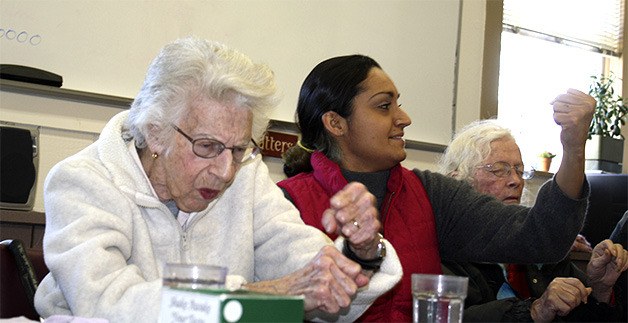Nearly 20 years ago, the Sno-Valley Senior Center in Carnation launched an adult day care program that evolved into today’s Adult Day Health. Later this year, the center may move to close it down.
On Saturday, the Sno-Valley Senior Center Board will meet to discuss its progress on preserving the struggling, but essential program.
A collaboration of the senior center and Snoqualmie Valley Hospital, Adult Day Health provides support, health care, socialization and supervision to frail adult patients four days a week, and much-needed respite for their families and care-givers. It is the only such program in the Valley, or within 20 miles, says program manager Karen Koenig.
It is also running at a deficit, of about $30,000 a year for the past two years, said Amara Oden, senior center executive director, due partly to declining enrollment, partly to shrinking funding from other sources.
Two years ago, “the senior center ended the year with some surplus and we were able to cover this deficit,” Oden said. However, the center ended 2013 with a deficit of its own, and couldn’t cover the ADH shortfall. “We will draw down on our emergency reserves to pay for this deficit, drawing our Center reserves far too low for an organization our size. We cannot financially support another $30,000 deficit….”
For the program to continue, it must become more self-supporting through reliable funding, increased enrollment, developing program scholarships and recruiting more committed volunteers. These are the criteria the center board is working on and will review progress on at their next meeting.
Funding falls flat
Outside funding has dwindled for the program lately. King County’s support of the program stopped about four years ago, Oden said, and state agency funding has also dropped over time. Koenig said these decreases have had a twofold effect, reducing both the immediate funding for the program, and its enrollment levels, because of fewer referrals.
Participants are asked to pay $70 per day, which covers only part of the cost, Koenig said. Last year, Adult Day Health cost $161,000 to operate, not including the salaries of the two program nurses, which the hospital provides. “That’s a good relationship there, because we’re helping people stay out of the hospital,” Koenig added.
Funding can also come from community members, who are being asked to make a three-year pledge to support the program.
“We are appealing to our community to keep this program here, so it’s here when people need it,” Koenig said. “What we’re asking for is one-time donations… or a three-year pledge, of any amount, really, so we know that our program can be sustained.”
Pledge goals
The goal of the pledge drive is $55,000 per year for the next three years.
Enrollment has dropped — the program can serve up to 22 people each day, and needs an average of 12, but has been serving fewer than that. “Our max is 12 per day,” said Koenig. “Our numbers have dropped in the past couple of years because of the lack of referrals and the lack of funding, but we’re starting to build back up again. We just need to get over this hump so we can be sustainable.”
The center has also started “advertising” the program more broadly. In a November letter to senior center members, board president Philip Koziol described contacting other ADH programs, the start of a caregiver support group, grant applications, flyers and other community outreach efforts to spread the word about the program.
“Unfortunately though, we have not seen increased enrollments from these efforts and without change, we estimate that we would have to close the program at the end of March 2014,” Koziol wrote.
The board has set a goal of raising $10,000 in donations for program scholarships as well, because the program is so expensive.
“We get a small amount of funding ($32 to $72 per day) that helps qualified participants pay for the program,” explained Oden. “Of course, many participants don’t qualify for the funding, or need more days than are allocated to them.”
Scholarships, provided by local business and community donors, can help both families and patients who need the help, and the program which needs the enrollment numbers.
Finally, the program, alway looking for volunteers, is hoping to recruit several for longer-term commitments, in an effort to save further costs. That’s not the only reason, though, says Koenig.
“We do rely on volunteers,” she said. “They make our program richer, they help us offer better individualized care. And they have a really good time!”
Volunteers are needed for three-hour shifts of helping with the various program activities. They won’t have any medical duties, Koenig said, but will instead be there “guide the people to be able to focus on the activity, round out the conversation, encourage people to participate…. Someone with dementia might get a little anxious, and if we have a volunteer that can spend a little one-on-one time with them, their day can be enriched, as well.”
To find out more, to volunteer, or to make a pledge, visit www.snovalleysenior.org.

Joan Wheeler, left, activities coordinator, plays a memory-honing game with Joyce Fugit, as part of the Adult Day Health program.


